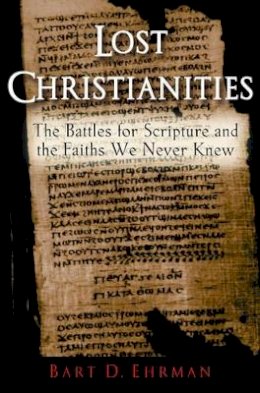3%OFF

Stock image for illustration purposes only - book cover, edition or condition may vary.
Lost Christianities
Bart Ehrman
€ 23.99
€ 23.34
FREE Delivery in Ireland
Description for Lost Christianities
Paperback. The early Christian Church was a chaos of contending beliefs. Some groups Christians claimed that there was just not one God. Certain sects maintained that Jesus was human but not divine; and others that he was divine but not human. This book offers a study of these forms of Christianity, and how they came to be suppressed, reformed, or forgotten. Num Pages: 320 pages, numerous halftones. BIC Classification: HRCC2. Category: (G) General (US: Trade). Dimension: 234 x 157 x 21. Weight in Grams: 430.
The early Christian Church was a chaos of contending beliefs. Some groups of Christians claimed that there was not one God but two or twelve or thirty. Some believed that the world had not been created by God but by a lesser, ignorant deity. Certain sects maintained that Jesus was human but not divine, while others said he was divine but not human. In Lost Christianities, Bart D. Ehrman offers a fascinating look at these early forms of Christianity and shows how they came to be suppressed, reformed, or forgotten. All of these groups insisted that they upheld the teachings of Jesus and his apostles, and they all possessed writings that bore out their claims, books reputedly produced by Jesus's own followers. Modern archaeological work has recovered a number of key texts, and as Ehrman shows, these spectacular discoveries reveal religious diversity that says much about the ways in which history gets written by the winners. Ehrman's discussion ranges from considerations of various "lost scriptures"-including forged gospels supposedly written by Simon Peter, Jesus's closest disciple, and Judas Thomas, Jesus's alleged twin brother-to the disparate beliefs of such groups as the Jewish-Christian Ebionites, the anti-Jewish Marcionites, and various "Gnostic" sects. Ehrman examines in depth the battles that raged between "proto-orthodox Christians"- those who eventually compiled the canonical books of the New Testament and standardized Christian belief-and the groups they denounced as heretics and ultimately overcame. Scrupulously researched and lucidly written, Lost Christianities is an eye-opening account of politics, power, and the clash of ideas among Christians in the decades before one group came to see its views prevail.
Product Details
Publisher
Oxford University Press, U.S.A.
Format
Paperback
Publication date
2005
Condition
New
Number of Pages
312
Place of Publication
New York, United States
ISBN
9780195182491
SKU
V9780195182491
Shipping Time
Usually ships in 15 to 20 working days
Ref
99-99
About Bart Ehrman
Bart D. Ehrman chairs the Department of Religious Studies at the University of North Carolina at Chapel Hill. An authority on the early Church and the life of Jesus, he has appeared on A&E, the History Channel, CNN, and other television and radio shows. He has taped several highly popular lecture series for the "Teaching Company" and is the author of The New Testament: A Historical Introduction to the Early Christian Writings (Third Edition, OUP, 2003) and Jesus, Apocalyptic Prophet of the New Millennium (OUP, 1999).
Reviews for Lost Christianities
Ehrman's racy style is gripping ... and he offers a vivid picture of what different groups believed and why.
The Church of England Newspaper
The strengths of this book are multiple. It brings together discussion about a range of significant texts; it builds a wider historical frame in which to understand such writings; it is appreciative of the diversity of Christianity and seeks to hear those voices that have hitherto been too often marginalized; and, it is extremely readable while remaining a significant work. This book should be read by all those who are keen to appreciate more fully the multifaceted nature of Christianity prior to the fourth century.
The Expository Times
The Church of England Newspaper
The strengths of this book are multiple. It brings together discussion about a range of significant texts; it builds a wider historical frame in which to understand such writings; it is appreciative of the diversity of Christianity and seeks to hear those voices that have hitherto been too often marginalized; and, it is extremely readable while remaining a significant work. This book should be read by all those who are keen to appreciate more fully the multifaceted nature of Christianity prior to the fourth century.
The Expository Times
